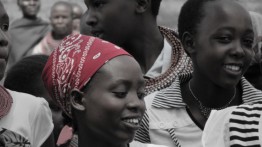Lecture by David Turnbull
Tuesday, November 22, 2011, 12:30 - 2pm

DAVID TURNBULL
Ooooh-yah…Oiiiyo..yo
Call & Response
Tuesday, November 22 2011 at 12:30pm
Room 315, Foundation Building
7 East 7th Street NY, NY 10003
Ooooh-yah…Oiiiyo..yo
Listening, watching…talking with the children and teachers at a rural primary school in Kenya, I realized the transformative potential of traditional dance, and of call and response song formations, in particular. I felt that I should have thought about this before. After all, ‘call and response’ is one of the roots that nourish rock and roll, R&B, the rhythms of political process, of consensus building. It defines, surely, the cadence of a new collective unconscious in formation.
I imagined a current, a stream that might run above, below or even through the complexities that I had witnessed; tribal conflict, patriarchy, poverty, disease, and the dissipative inertia that comes from the persistent chatter of pessimists, as much as the hymnals of those who would do ‘good’…
Listening, I heard the call. Anticipating the response, I heard another sound, low, as if caught in the throat of the caller. I saw the beginning of a movement, one person, then another, and another, and I heard the sound, increasing in volume, syncopated, polyphonic…but singular.
David Turnbull, professor in the Irwin S. Chanin School of Architecture is a director of ATOPIA design<>communication<>urbanism (LLC), and a founder and Design Director of ATOPIA_RESEARCH (inc).
ATOPIA and ATOPIA_RESEARCH run on parallel paths, but knowledge migrates from one to the other. ATOPIA_RESEARCH, a 501(c)3 non-profit corporation, supported by a major grant from The Annenberg Foundation, tends to work in some of the most ecologically challenging areas of the World, Sri Lanka (post Tsunami), Sudan (post Civil War), The Mississippi Delta (post Hurricane), The Ogalala Aquifer (ecological devastation caused by Agri-business), Sichuan, China and Haiti (post Earthquake). ATOPIA (for profit) tends to work on projects that have the potential for ecological or technological detournement in commercial or institutional environments.
This event is co-organized with
The School of Architecture Student Lecture Committee.




